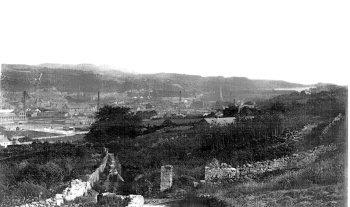Paler and thinner the morning moon grew
Colder and sterner the rising wind blew;
The pole-star had ser in a forest of cloud,
And the icicles crackled on spar and on shroud,
When a voice from below we heard feebly cry:
‘Let me see. I shall see my own land ere I die.
Ah dear sailor, say, have we sighted
Can you see any sign? Is the morning light near?
You are young, my brave boy; thanks; thanks for your hand –
Help me up till I get a last glimpse of the land.
Thank God, ’tis the sun that now reddens the sky;
I shall see, I shall see my own land ere I die.
Let me lean on your strength, I am feeble and old
And one half of my heart is already stone-cold.
Forty years work a change! When I first crossed the sea
There were few on the deck that could grapple with me;
But my youth and my prime in
And I’ve come back to see the old spot ere I die.’
”Twas a feeble old man, and he stood on the deck
His arm round a kindly young mariner’s neck,
His ghastly gaze fixed on the tints of the east
As a starveling might stare at the sight of a feast.
The morn quickly rose and revealed to his eye
The land he had prayed to behold, and then die!
Green, green was the shore, though the year was near done;
High and haughty the capes the winter surf dashed upon;
A grey ruined convent was down by the strand
And the sheep fed afar on the hills of the land!
‘God be with you, dear
‘I have lived to behold you! I am ready to die!’
He sank by the hour and his pulse ‘gan to fail,
As we swept by the headland of storied Kinsale;
Off
And his corpse was clay-cold as we sighted Tramore.
At Passage we waked him, and now he doth lie
In the lap of the land he beheld but to die.’
Thomas D’Arcy McGee (1825-1868) : Carlingford Poet
